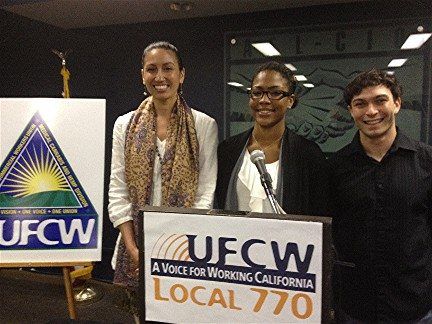
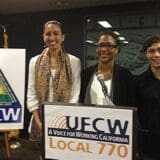
I am an office assistant at the Venice Beach Care Center, a medical cannabis dispensary. I’m also a student at Santa Monica College studying kinesiology. I love my job because it gives me a chance to give back and make a difference — some people who live in pain have chosen an alternative way of healing to manage their sickness, and we are here for them. My job also gives me a chance to interact with people, sharpen my communications skills and develop compassion for patients who need our help.
Every day I wake up and realize I’m a part of something new and historical — and I hope that people’s views of the medical cannabis industry and of employees like myself are changing. Just like other American workers, I dream of a better life for myself — the future I create starts here today, small and local.
Working at the dispensary has made it possible for me to put myself through school and help support my mom.
» Read more about: Blunt Talk: What Marijuana Pharmacy Workers Want »


Last week, the AFL-CIO released a statement – “Restoring Democracy” – on the Supreme Court’s historic ruling in the Citizens United case.
The federation eloquently and accurately inveighs against “excessive corporate influence” in the political process, calling for “greater balance . . . transparency and disclosure . . . restoring Congress’ ability to regulate campaign spending,” and “abolishing corporate ‘personhood.’” If necessary, the AFL states, we should pass a Constitutional amendment to overturn Citizens United. To be sure, all of these things are true: Citizens United is bad for democracy in general, and especially bad for labor, as it makes the political playing field further unbalanced in favor of corporations and the wealthy.
In the spirit of full accounting, though, let’s acknowledge that the ruling does give labor something: For the first time in the modern history of a presidential race,
» Read more about: Cash of the Titans: Life After Citizens United Ruling »
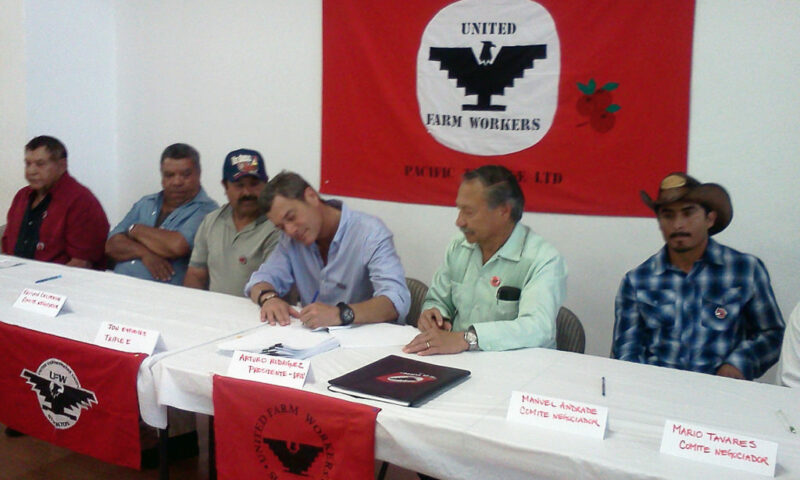

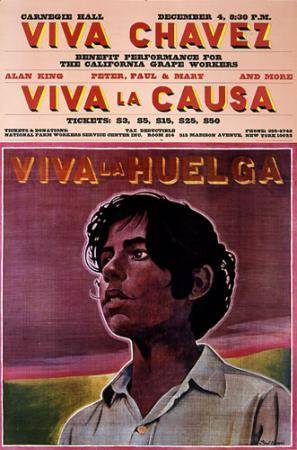 Anyone involved in the United Farm Workers campaigns of the 1960s and ’70s will tell you how critical those efforts were – not only to the well-being of farmworkers, but to the participant’s identity and the development of his or her views on labor and the world.
Anyone involved in the United Farm Workers campaigns of the 1960s and ’70s will tell you how critical those efforts were – not only to the well-being of farmworkers, but to the participant’s identity and the development of his or her views on labor and the world.
Many activists, like myself, were not vineyard or orchid pickers, but merely college students who helped organize local boycotts and picket lines far from the state’s embattled valleys. Yet even we sometimes glimpsed first-hand the epic human struggles that were transforming California’s agriculture, as I did during a brief summer stint in the 1973 grape strike outside Fresno.
To this day sense impressions remain vivid: The stifling 104-degree heat of the picket lines; the revivifying cold of the Kings River at night; the sweet sound of Superior Court Judge Peckinpah (Wild Bunch director Sam’s brother) ordering the release of thousands of farm workers from jail after they’d been arrested for protesting;
» Read more about: A People’s History of the Farmworkers Movement »


Calling on California’s leaders to invest in their state, the California Labor Federation (CLF) today unveiled an ambitious plan to pull the state out of its economic slump.
The seven-point plan begins by urging construction of the long-planned, oft-fought high-speed railway line that would connect San Diego, Sacramento and the Bay Area. Only a few years ago this seemed like a staggering but plausible infrastructure project – a magic bullet train, as it were, that would create thousands of good, lasting jobs. But when the recession hit, it stalled – and since then territorial politics have stopped the project in its tracks, along with some new cost projections for a much higher than expected construction price tag. The CLF plan asks legislators to begin releasing money from Prop 1A bonds that were passed by voters in 2008.
The CLF plan’s other planks include the following:
» Read more about: Calif. Unions Push for Jobs, Push Back on Pensions »


I raise money for LAANE, the Los Angeles Alliance for a New Economy. Asking other people for money isn’t something most people are comfortable with, but I do it every day because it’s the way I serve, how I heal the world. It’s the thing I can do, and I couldn’t look into the faces of people struggling in my community and say, “Sorry, it felt weird to ask for a check.” But I often wonder, “Who gives and why?”
A lot depends on knowing the answer to that question, and the truth is we don’t always have one. We know that people give because they are asked. If you don’t ask, you don’t get. But we get turned down a lot even when we do ask. Sometimes our cause just doesn’t resonate with the donor, and that’s okay. But sometimes – a lot of the time, most of the time – a donor is a donor because they have some spark in them that demands they give back.
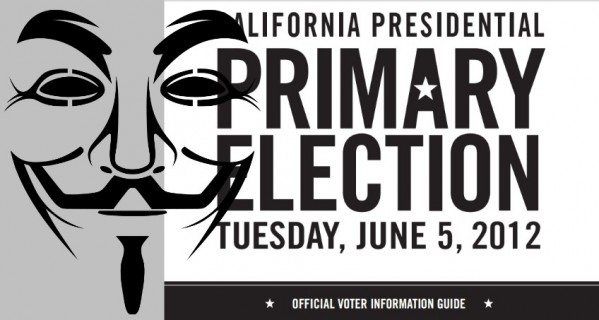
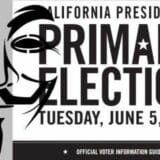
We’re thoroughly non-partisan here at Frying Pan News, but still we get many questions about voting. Most of them are about American Idol, but once in a while someone wants to know about elected officials. And while we still won’t tell you how to vote (though Professor Wagstaff’s dictum isn’t a bad place to start), we can happily answer some of your process questions.
Q: Hey, I heard a lot recently about voters “making mischief” in the presidential primary in Michigan. ’Sup with that?
A: It’s true—at least it’s true that you heard a lot about it, though there’s little evidence of any actual mischief-making. But some states do allow (just about) anyone to vote in (just about) any primary. In Michigan, the story goes, some Democrats – convinced that Romney would be the stronger opponent in the fall – crossed party lines to vote for Santorum in the primary,
» Read more about: Making Mischief in California Primaries »


By Johnny 5 Hanrahan
I, along with 30 other talented, hardworking crew members, was fired recently from a successful, internationally popular TV show called 1000 Ways to Die. Our crime: Trying to unionize. Joining the union would allow us to have health insurance — something that is not asking for too much, especially from a hit show. It is easy to take advantage of a reality TV crew in this economy, especially for low-ball rates, by having members work 70-plus hour weeks on their feet, as they make nearly minimum wage in a non-union atmosphere. We wanted the opportunity to live the better, healthier lives which we deserve; hence we contacted unions to help us with that. “Together we are what we cannot be alone. United we stand, divided we fall.”
Reps from the Teamsters and IATSE (International Alliance of Theatrical Stage Employees) came to the set on our behalf —
» Read more about: Reality TV Bites: “Blue Collar” Show Fires Its Workers »


By Kate Sheppard
(This post originally appeared on Mother Jones .)
Climate Central has released a new in-depth report on the combined impacts of rising seas and storm surges. With rising water levels, more people and property are at risk—especially during storms, which force water farther inland. Here’s an excerpt from the executive summary:
Global warming has raised sea level about eight inches since 1880, and the rate of rise is accelerating. Scientists expect 20 to 80 more inches this century, a lot depending upon how much more heat-trapping pollution humanity puts into the sky. This study makes mid-range projections of 1 to 8 inches by 2030, and 4 to 19 inches by 2050, depending upon location across the contiguous 48 states.
Rising seas dramatically increase the odds of damaging floods from storm surges. For more than two-thirds of the locations analyzed (and for 85% of sites outside the Gulf of Mexico),
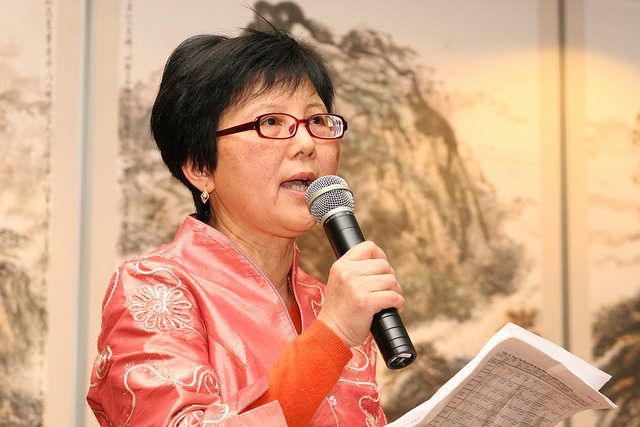

By Julie Chow
In a soon-to-be released report, the UCLA Center for Health Policy Research states, “Paid caregivers caring for recipients of Medi-Cal fare the worst in monthly income, job stability, home ownership, health insurance coverage, delays in obtaining medical care and food security. Data from the 2009 California Health Interview Survey suggest that paid Medi-Cal caregivers face hidden costs and are at risk for continued economic uncertainty.”
As a caregiver for over 10 years, and as part of my union’s Los Angeles contract committee, I can tell you that the statement above is more than accurate. We’ve heard from hundreds of our caregivers — their top concerns are job/wage security and access to quality health care. So, as we continue to negotiate with Los Angeles County, these are two of our top priorities.
We recognize that this economy has affected more than just ourselves; we see it in our neighbors,